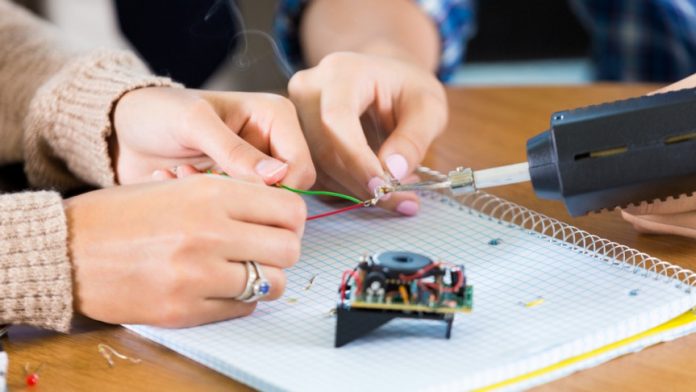Utilizing these resources, high school students can get started on their engineering educational journey.
For many, engineering is a passion that spans their entire life. Whether it be from your first time playing with LEGOs or always taking apart your toys to see how they work, sometimes you’re just made to be an engineer. For others though, engineering can seem like a daunting and sometimes uninteresting profession.
Regardless of your level of interest in a subject, engineering or anything else, if you’re thinking about studying the subject for the next 4 years of your life, it’s generally a good idea to get acquainted with it before you make that decision.
RELATED: 15 OF THE BEST ANDROID APPS FOR ENGINEERS
Luckily for those who are looking to go into engineering, there are plenty of options to get hands-on experience before committing to years of college.
We’ve compiled a grouping of different options for anyone looking to study engineering before a traditional 4-year degree.
MIT Open Courseware presents some of the best free-to-use coursework on engineering anywhere on the Internet. They have content for nearly every degree path, but for engineering, they have courses from MIT’s prestigious School of Engineering.
MIT does make a note on their website that most of their engineering coursework is geared towards electrical, computer, and mechanical engineering fields. So if you’re looking to get into civil, manufacturing, or any other engineering discipline not listed, you might have to look elsewhere.
Notable courses are “Making Science and Engineering Pictures: A Practical Guide to Presenting Your Work” and “Exploring Sea, Space, and & Earth: Fundamentals of Engineering Design.“
For those of you looking to get more hands-on engineering experience, there are plenty of in-person opportunities to learn during the summer months while school is out. We’ve compiled just a few below, but keep in mind that these on-campus programs aren’t free, and in some cases can be costly.
It should be noted, the opportunities we link below are U.S. based, but if you’re located elsewhere, universities around the globe offer similar programs.
Johns Hopkins University offers an introductory course specifically for high school juniors and seniors. It has several locations across the U.S. and teaches a variety of engineering-focused skills. Ranging from critical thinking to problem-solving, students will attend lectures, do research, and even will have projects. Any high-schooler that gets an A or B in the program also gets transfer credits to the university!
The Summer Academy at Carnegie Mellon is specifically geared towards juniors and seniors in high school – and it’s quite rigorous. There are separate tracks for the student’s grade level and the courses range from lectures to ultra-hands-on projects. It also runs for 6 weeks and students actually live on campus in Pittsburgh, Pennsylvania while they attend.
Specifically for high school seniors, the University of Notre Dame‘s summer program offers the opportunity to explore different career paths within the engineering discipline. This 2-week program offers attendees that ability to experience college life at Notre Dame while they live on campus and attend lectures in their interests within engineering. Notre Dame does offer limited scholarships to cover the cost of the program if accepted.
If you’re looking for an in-person engineering exploration program that isn’t quite so geared towards a specific school, then the programs offered from the National Student Leadership Conference might be the right choice.
These summer programs for high school students let attendees explore their desired field of engineering at week-long camps held across the U.S. One benefit to this option is there are a plethora of dates and locations, meaning that you can choose what works best for you, rather than having to alter your schedule around one university’s rigid calendar.
These programs are more geared toward general engineering discovery. Part of the curriculum also involves engineering leadership classes so that you can be prepared to be an engineer down the line
Over the years there have been many providers of online courses that are open to the general public. Top providers for engineering specific or STEM-related content are Coursera and/or Udacity, but there are tons of other providers that a quick Google search would turn up. These platforms offer up free access to online courses and even can provide interaction with other students.
The National Science Foundation has provided free resources for all things STEM, from coursework to helpful industry summaries. Once you get over the early-2000s web design, you’ll find a plethora of helpful resources and you might even be surprised by what’s been extensively collected here.
If you’re still trying to find what industry is right for you, this Technology Education site endorse by the NSF gives you helpful descriptions of different fields.
If you’re a high-schooler or someone interested in engineering, then you might be wondering what the best next step is. The answer is, it depends. If you know that you want to get into engineering but are still trying to figure out just what specific field, then your best bet is probably to take some courses related to your interests and see if you like it.
If you’re set on one particular tract of engineering, then you might even try reaching out to local engineers on that path to talk to them about their jobs.
At the end of the day, Engineering is a diverse and rewarding career path that can lead you to a variety of jobs around the world, from Aerospace to bridge design. Learning more about what interests you is a step in the right direction for any high school student.
By subscribing, you agree to our Terms of Use and Privacy Policy. You may unsubscribe at any time.
By subscribing, you agree to our Terms of Use and Privacy Policy. You may unsubscribe at any time.






